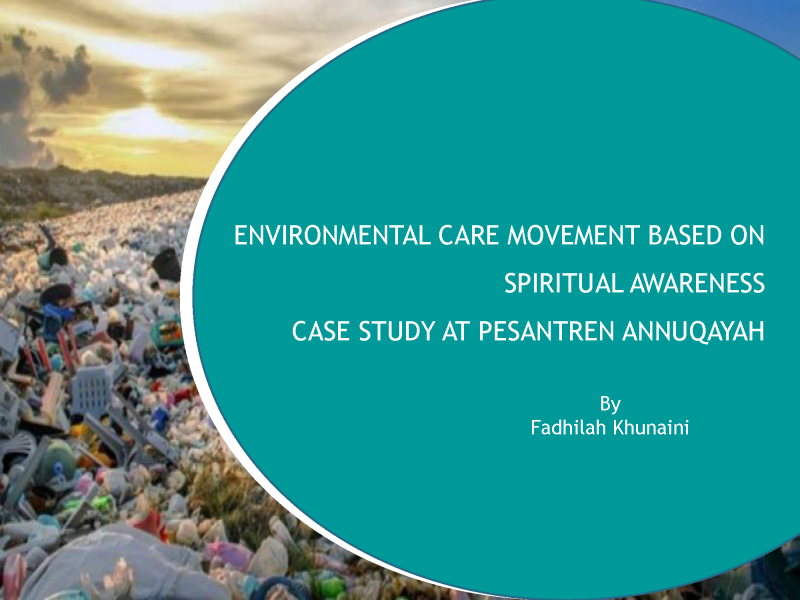Spiritually Caring for Creation’s Health
Elina Welmiria Otu
The Netherlands-Indonesia Consortium for Muslim-Christian Relations (NICMCR) organized a webinar under the theme “Spiritual Care & Planetary Health” on October 26, 2023. This webinar was led by Frans Wijsen as moderator. As the opening words, he introduced the gender working group of NICMCR, which was founded in 2019, as the organizer of this event.
The speakers discussed topics around spiritual care, environmental crises and gender issues according to their respective country backgrounds. The first speaker, Hans Alma, is the chair of spiritual care and religious humanism, as well as a professor of spiritual care at the Vrije Universiteit in Amsterdam. She explained the conceptual meaning of webinar’s theme while giving some practical examples that had been carried out by environmental activists and religious institutions in the Netherlands. The second speaker is Fhadilah Kunaini, who is a teacher at Pesantren Annuqayah in East Java Province, Indonesia. The third speaker is Christine Handayani, the managing director of East Indonesian Women’s Network (Jaringan Perempuan Indonesia Timur, JPIT). The last two speakers discussed more practical topics regarding the spirituality of religious communities in responding to ecological issues in Indonesian experiences.
 Hans Alma attempted to explain the connection between spiritual care (geestelijke verzorging) and planetary health. Spiritual care is needed to provide professional assistance and counseling for people facing existential challenges. They are usually served in hospitals, prisons, and even in households. Spiritual care can’t ignore climate change, loss of ecological diversity and other ecological crises that affect human beings physically and mentally. Then she explained the meaning of planetary health, as a new term in the academic field. Planetary health talks about the equal world of the health of all creation that leads to action of social movements to restore our relationship with the rest of nature.
Hans Alma attempted to explain the connection between spiritual care (geestelijke verzorging) and planetary health. Spiritual care is needed to provide professional assistance and counseling for people facing existential challenges. They are usually served in hospitals, prisons, and even in households. Spiritual care can’t ignore climate change, loss of ecological diversity and other ecological crises that affect human beings physically and mentally. Then she explained the meaning of planetary health, as a new term in the academic field. Planetary health talks about the equal world of the health of all creation that leads to action of social movements to restore our relationship with the rest of nature.
Alma expressed the paradoxical reality in religious life, especially from the perspective of Christianity. On the one hand, Christian understanding of human beings as the crown of creation may lead people to anthropocentrism which contributes to ecological crises. On the other hand, the Christian belief teaches us about the love of God for all creation. This view has more eco-centric elements in which human beings are obligated for the wellbeing of all.
Alma borrows Brown Taylor’s thoughts in his book entitled Dark Green Religion (2010) to differentiate the dominant attitudes towards nature found in various religious communities. The first position is called green religion which posits that environmentally friendly behavior as a religious obligation, but it still has a hierarchical relationship in which humans are masters above the nature. The other position is dark green religion in which nature itself is considered to be sacred. The second view opens up a more equal space in the relationship between human beings and nature.
She then gives some examples on how spiritual care and planetary health are interrelated. The first example is Climate Free Space (Klimaatvrijplaats) founded by the Humanist Association (Humanistisch Verbond) in the Netherlands. This program was created for people to share their challenges and gain support by peers or professional caregivers to keep working for the nature. From Christianity, there is the Dominicus Church, at the Amsterdam City Center that serves people with religious ceremonies and offers places for silence for those who are struggling with mental health. Meanwhile, from Buddhism, Joanna Macy, a Buddhist ecologist, introduced rituals and morning routines to mourn the loss of other creatures.
 Fadhilah Khunaini continued the second session by revealing that the environmental crisis is a real manifestation of spiritual crisis. According to Khunaini, “love” is the keyword to grow everything and in that sense spiritual awareness comes from love. Spirituality is the heart of Islam, whereas Islam is not a historical phenomenon that began 1400 years ago, but the timeless art of awaking by means of submission. Islamic tradition has its ethical foundation to build environmentally caring characters, such as maintaining relationships between humans and God through worship, between fellow humans, and between humans and the universe. Ethical principles used at the Annuqayah Islamic boarding school include: prioritizing obligations over rights, avoiding greed, increasing spirituality through Islamic worship or rituals (reading Yasin, Waqiah, and sholawat Dalail Al-Khoirat).
Fadhilah Khunaini continued the second session by revealing that the environmental crisis is a real manifestation of spiritual crisis. According to Khunaini, “love” is the keyword to grow everything and in that sense spiritual awareness comes from love. Spirituality is the heart of Islam, whereas Islam is not a historical phenomenon that began 1400 years ago, but the timeless art of awaking by means of submission. Islamic tradition has its ethical foundation to build environmentally caring characters, such as maintaining relationships between humans and God through worship, between fellow humans, and between humans and the universe. Ethical principles used at the Annuqayah Islamic boarding school include: prioritizing obligations over rights, avoiding greed, increasing spirituality through Islamic worship or rituals (reading Yasin, Waqiah, and sholawat Dalail Al-Khoirat).
Pesantren Annuqayah has developed environmental consciousness since it was founded by Kyai Syarqawi. There are three foundational principles enabling Pesantren Annuqayah to sustain environmental consciousness: 1. actualizing the value of amal sholih (virtuous deeds) 2. doing every environmental action for the sake of Allah 3. what has been done by Pesantren Annuqayah for the environment should always be recognized by both students and society.
In 1981, the president of Indonesia presented the Kalpataru (Tree of Life) award, the most prestigious environmental award in Indonesia, to the Islamic boarding school. At that time, Kyai Basith, as the young leader in the early 1970s, was playing an important role. Now the Annuqaya Islamic Boarding School is being developed by the fourth generation with more varied ecological challenges. Because of this, teachers implement various programs to develop love for the environment, such as providing an environmental curriculum, promoting the “cool” rubbish scavengers, a campaign to control the use of plastic bottles/water/electricity, and planting herb plantation.
The last speaker, Christine Tri Handayani, presented the joint research project of NICMCR and JPIT regarding the impact of tropical cyclone Seroja on women living in the coastal area of Kupang City. The disaster that occurred on April 4, 2021 caused casualties, injuries, damage to residents’ homes and public facilities, trauma and economic paralysis. Coastal communities need family empowerment programs, education on disaster mitigation and support system for recovery.
 Both Christian and Islamic leaders in Kupang City showed solidarity and provided supports for communities affected by cyclone Seroja. They prepared church buildings and mosques as refugee camps even though they had limited facilities. Religious institutions gave psychological and mental supports that encouraged coastal women to continue living with hope.
Both Christian and Islamic leaders in Kupang City showed solidarity and provided supports for communities affected by cyclone Seroja. They prepared church buildings and mosques as refugee camps even though they had limited facilities. Religious institutions gave psychological and mental supports that encouraged coastal women to continue living with hope.
The research project concluded that coastal women already have a strategic mechanism to withstand the struggles in coping with family needs in times of disaster. Nevertheless, the study shows that several measures should be taken in order to strengthen the resilience in countering coming disasters, such as 1. empowering religious leaders by way of capacity building programs on disaster-management and involving them in programs related to disaster-mitigation. 2. involving churches, mosques and other houses of worship in disseminating information regarding potential disaster warnings. 3. improving emergency procedures and hydrometeorological disaster-rehabilitation programs so that the needs of affected communities can be met and 4. recommend regional and/or provincial governments to provide medium and/or long-term operating loans to help coastal communities restore the condition of their productive assets.
In the Question-and-Answer session, participants were given discussion space to deepen the material. Some highlights of this session were answered by Fadhilah who explained about the caliphate, ablution before praying, and the environmental movement in Sumenep, East Java. She noticed the concept of khalifah in Islam as a responsibility to sustain the earth. She also explained that according to Islamic law, in the case of drought or when it is difficult to find water, Muslims can replace water with other alternatives. She emphasized that the environmental movement in Sumenep was driven by activists who had great potential to build networking partners with spiritual or religious leaders, and the government. Alma added how she appreciated the environmental movement in Sumenep which could influence government’ policy.
At the end of the webinar, the moderator concluded that spiritual leaders, such as religious leaders, have played important roles for planetary health. Everyone can take part in contributing to the sustainability of our planet.
